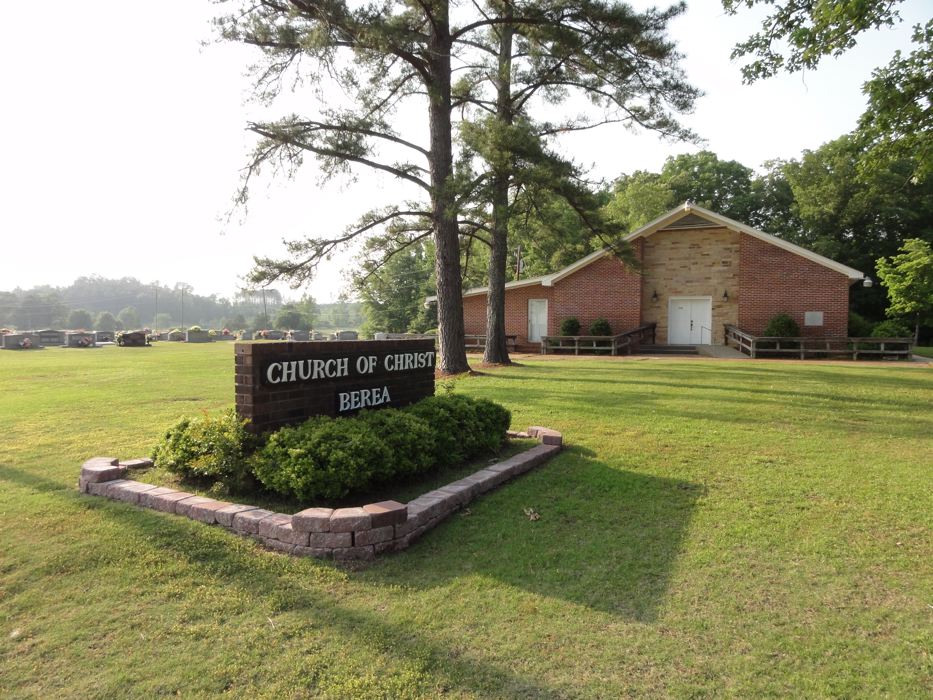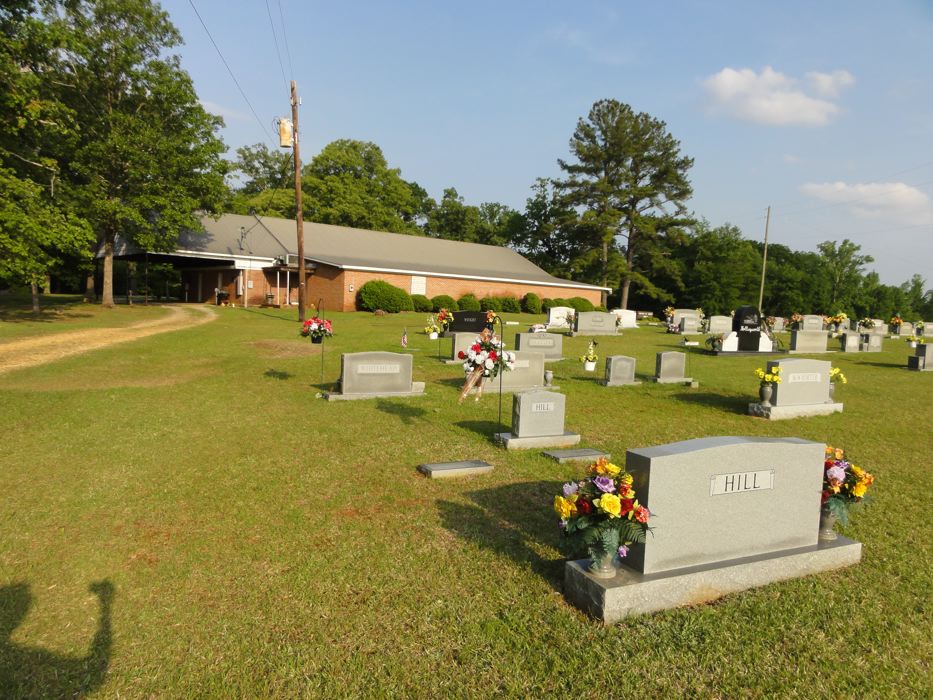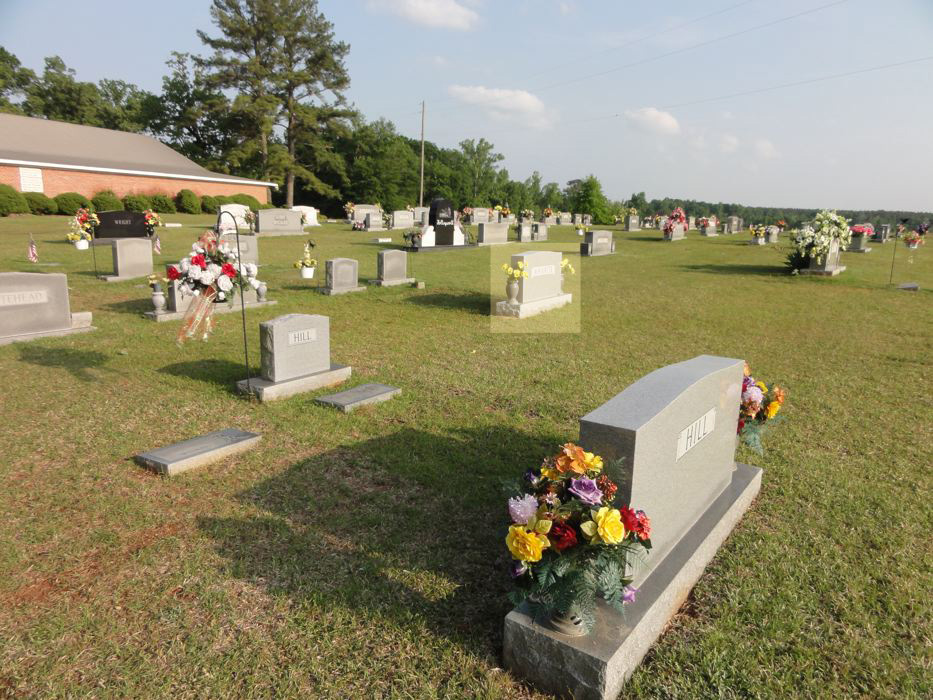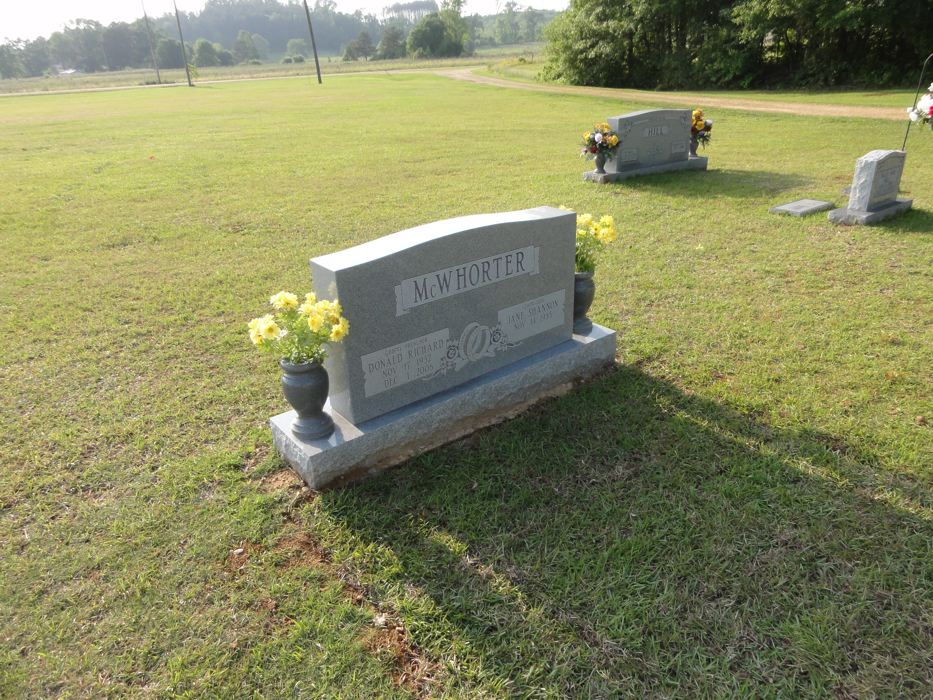Donald Richard McWhorter
1932-2008

![]()
A Lifetime of Preaching with No Regrets
A Biographical Sketch of Don McWhorter
1932-2008
Three months before Don McWhorter's unexpected death in 2008, someone asked him ifhe had ever wished he had gone into some other line of work after fifty-eight years of preaching. Without pausing for a second, he replied, "No, preaching is the only thing I've ever wanted to do since I obeyed the gospel. From the time I was baptized, I've always wanted to tell other people what I had learned. It has been a rich and rewarding life with no regrets." What was there about this preacher that made him so dedicated to his work?
Early Years
Don was born on November 17, 1932, to Gordon and Ella (Madaris) McWhorter in Chickamauga, Georgia. He had a brother named Douglas, who died at the age of nine, and a sister named Marilyn. Although they were good moral folks, his parents and most of his other relatives were not "church-going" people. Many of his father's people were farmers, but Gordon worked long hours in a cotton mill. He developed an interest in repairing watches at his home, using his own home-made tools. Eventually he began a little business of his own in a corner of a service station on weekends in Chickamauga. Several years later he moved his family to Rossville, Georgia, where he opened Mac's Jewelers, a business of repairing watches and selling jewelry in downtown Rossville. In Rossville Don attended the public schools, making very good grades. Near the end of his high school years, he was awarded a National Merit Scholarship, giving him a chance to go to college with all his tuition paid. He was the first person in his family to attend college. No one in Rossville had ever received this kind of scholarship. The businessmen were so proud of this honor that they gave him a new convertible during his senior year. (However, after driving it for about six months, it was Don's own idea to sell his car and give the money to his parents to remodel their house.) Using his scholarship, Don began his college work at the University of Tennessee in Chattanooga, majoring in math.
Although Don's family had not attended any kind of church services very often while he was a young boy, his mother's religious background was Methodist. Consequently, he had been sprinkled when he was about ten years old and attended occasionally with her, sometimes playing the piano in the Methodist church. After the family moved to Rossville, Georgia, he joined the Baptist church because "they had a better baseball team."
After enrolling at the University of Tennessee in Chattanooga (just over the state line from his hometown of Rossville, Georgia), Don began questioning some of the doctrines taught by the Methodist and Baptist churches. This quest for the truth prompted him to begin attending the services of various religious groups. Although some of his dad's people were members of the Lord's church, Gordon had seldom attended and had never been baptized. During Don's junior year of high school his dad was immersed into Christ. Occasionally he would ask Don to attend with him, but Don always declined. One day Don responded favorably to his dad's request and went to the Sunday morning service with him at Forty-seventh Street church of Christ in Chattanooga, Tennessee.
The preacher was Homer Daniel and he preached a very plain, fundamental lesson about the Lord's church and the necessity of baptism. Don was furious. That morning he made an appointment to talk with the preacher the following Thursday night because he could easily "show that man how wrong he was."
Don studied all week. The more he studied, the more convinced he was that brother Daniel was absolutely correct in his preaching. He was proclaiming what the Bible taught. Don returned to the Forty-seventh Street church the next Sunday morning. Bro. Daniel met him at the door and asked why he had never shown up for their appointment to talk the previous Thursday night. Don told the preacher that he had studied all week and had found the truth. Furthermore, he had brought extra clothes so he could be baptized that morning, one week after hearing his first gospel sermon. That very same afternoon Don talked with his mother, and she was baptized at the evening service. The next week the preacher asked him to read a lengthy portion of the Bible for their scripture reading the following Sunday. Don did not just read the verses. He quoted them. Everyone encouraged him to be a preacher. Don, however, had already made that decision when he was baptized. Nothing was going to stop him. During the following months, he preached at several different congregations near that area. The young convert felt that he truly needed to attend a college affiliated with the church because of the Bible courses they offered. He applied at David Lipscomb, only to learn that his college scholarship was non-transferable. Consequently, he was on his own to work his way through four years at Lipscomb because his family was not financially able to help him. He had already sold his convertible to help his parents pay for the remodeling in their aging house. Of course, Lipscomb did not allow freshmen to have cars on campus at that time anyway, so Don boarded a Greyhound bus bound for Nashville during the third quarter of the school year with one suitcase in hand to begin his years at a Christian college. (At that time he had never even heard of our other Christian schools.)
Some of Don's professors found places for him to preach. Because he had no car, he had to depend upon the Greyhound bus line for transportation to his middle-Tennessee appointments every Sunday. Years later he told others about being paid with the cash (mostly coins) that had been collected that morning and how weighted down his pockets were as he boarded the bus.
Financial necessity forced Don to drop out of Lipscomb twice for six months at a time to return home to Rossville and work in the woolen mill to save enough money to return to his college work. Even during this time, he was determined to preach. After working all Saturday night he would come home on Sunday morning, shower and change clothes before catching a bus for a preaching appointment. Finally Dr. Carroll Ellis helped Don secure a regular preaching appointment at the Oakwood congregation near Clarksville, TN. This income allowed him to return to his studies without his previous financial struggles and also gave him three years of preaching experience.
Because of the breaks in Don' s college work for financial reasons, obtaining his degree required five years instead of four. During those years he was very active in speech work, especially Lipscomb's Intercollegiate Debate Team, winning many honors, including second place at West Point where thirty-three outstanding teams of the nation competed.
Jane McWhorter, who later became Don's wife, was also active in Lipscomb's intercollegiate speech program. This extracurricular work provided the circumstances for the two students to meet. They both wanted to spend their lives serving God and were soon attracted to one another. Don graduated in 1955, but Jane had not yet completed all her courses. A year later they were married by Dr. Carroll Ellis, head of the Lipscomb speech department, on August 21, 1956. His closing prayer asked God to bless the union of this couple in their desire to serve God together. How prophetic his words were.
Located Works
After Don' s graduation he spent the following summer conducting gospel meetings, primarily in the Sequatchie Valley in eastern Tennessee. Then in September of 1955 he returned to his hometown of Rossville, Georgia, to begin his first located work at the Brian Street congregation as a single preacher. After their wedding in August of 1956 Jane joined him. They labored together in Rossville until 1958 when they moved to Lafayette, Georgia, to work with the church there. While living at Lafayette, their first child, Kathy, was born.
In 1962 the elders from the East Gadsden church called Don one night, asking him to assume the work that Franklin Camp had been doing for a number of years because Franklin had just resigned and had recommended Don. He accepted their offer over the phone and moved his family to Gadsden that summer. Three months later the McWhorters' son, Greg, was born. Don labored with the East Gadsden church until 1969, when he moved to the Green's Lake Road congregation in Chattanooga. In addition to being the pulpit minister there, he also served as an elder for several years. He stayed at Green's Lake Road until 1974, when he joined hands with the brethren in Fayette, Alabama, and worked with them as pUlpit minister until 1993. At that time he assumed the fulltime responsibilities of the congregation's radio and television work and was followed in the pulpit by Phil Davis. Don continued in this media capacity until his death on December 1,2008, after more than thirty-four years of service with the Fayette congregation. It is worth noting that he was active in this realm of service until the very last of his life. Just four days before entering the hospital for the two-week illness prior to his death, Don taped his last two television programs. He had always wanted to continue to be active in his preaching until the very end, and his wish was granted.
A summary of his located work follows:
1955-1958 Brian Street in Rossville, GA
1958-1962 LaFayette, GA
1962-1969 East Gadsden in Gadsden, AL
1969-1974 Green's Lake Road in Chattanooga, TN
1974-2006 Fayette, AL
Gospel Meetings
Near the latter years of Don McWhorter's life, his biographical sketches stated that he had spoken in over 1300 gospel meetings, campaigns, and lectureships. They began during his junior and senior years in college and continued until the end of his life.
During the time of the first meetings, it was the custom for the "visiting preacher" to stay in someone's home. Often these meetings were in rural sections, far from motels. Don often regaled his friends with stories of what life was like during those days, such as having to share a bedroom with two young boys (one double bed). However, because he was the honored guest, Don and the boys got to keep the cat in their bedroom that week to kill the mice! As time went on, customs changed and motels became the lodging place for visiting preachers. However, he always spoke with gratitude when talking about how much those early meetings meant to him.
During Don's years of service he spoke on lectureships in most of our Christian colleges and universities and was a frequent speaker on some of them. It may be of interest to note that Don never took any notes into the pulpit with him. Before he began his lessons, he had memorized his outlines as well as all the verses he planned to use. He always carried a thin Bible into the pulpit with him but never read from it. He called it his "slapping Bible" because he would pop it across one of his palms to emphasize a point. Consequently, he never lost eye contact with his audiences.
Gospel Broadcasting
Don McWhorter spent more than 52 years in gospel broadcasting with more than 40 years of daily programs. During the early years he called his programs Bible Talk, a name that continued until his death and which is still used by the Fayette church as they continue the radio and television work with their pulpit minister, Kevin Beard. Through the efforts of Gospel Broadcasting Network (an internationally syndicated television work), Bible Talk is telecast in every state in the United States several days a week by satellite and may be seen on the Internet anywhere in the world where that service is available.
Religious Debates
Don's debating experiences in college provided the training he needed to combat religious error through numerous public debates. One such debate was with the well known Baptist preacher Bob Ross and was televised nationally on the John Ackerman program. Another significant debate was with W. C. Nevil, a Baptist preacher from Oklahoma City on the subject of Baptism and Apostacy.
Another debate of note was conducted in 1989 at the Preachers' and Church Workers' Forum at Freed Hardeman University on the role of women in the work of the church. The transcript of that debate has been published in the book, Gender and Ministry. Writings
Don McWhorter is the author of God's Woman: Feminine or Feminist, a book based upon his preparation for the Freed-Hardeman debate on that subject. Don coauthored a book with his wife Jane on marriage (Living Together in Knowledge). They often joked that they were still happily married, even after writing a book together, so there was hope for all couples.
In addition to his books, Don has written numerous articles that have appeared in many brotherhood publications throughout the years.
For a number of years Don had studied the book of Revelation in depth and had taught it several times. Approximately two years before his death, he discussed its message on his television program in a series of twenty-one lessons. Requests for the tapes continue to be made. He had planned to write a book on the meaning of Revelation. Sadly for the brotherhood, most of the book was still in Don's mind with little having been put on paper when he died.
Travels
Don's love of foreign travel began when he led a group of Christians to Israel and Greece in 1970. He took two more groups to Israel, but most of the remainder of his foreign trips were based upon campaigns in which he was involved or other preaching appointments. His work carried him around the world to more than 30 nations in Europe, Africa, Asia, and the Caribbean. In addition to his work, Don and Jane were able to visit a number of foreign countries for their own enrichment.
Honors
Throughout the years Don McWhorter was honored with a number of different awards, including National Award for Distinguished Broadcasting, Personalities of America, Men of Achievement, Marquis' Who's Who in Religion and Who's Who in the South.
In 2004 a dinner given by Southern Christian University (now Amridge University) in Montgomery, Alabama, honored him for more than 50 years of church work around the world. In 2005 Memphis School of Preaching named him Honorary Alumnus. In 2007 a dinner was given in his honor by that same school. Hobbies and Family
Don had been preaching "full speed ahead" when he first began local work. Some health problems sent him to the doctor. The wise medical advice was: "You can continue at this pace and only live a short time doing the work you love or you can be sensible. If you will take some breaks, you will live more years and be able to accomplish many more of your goals."
Don took the doctor's advice. That week he bought a gun for squirrel hunting, and thus began his love for the outdoors and hunting. The targets for his gun changed from squirrels to deer, but his love for the sport only intensified during the passing of the years. Don often talked about the quiet time for praying and how many sermons he was able to prepare while on a deer stand. Some of his hunting friends told about his habit of taping the television program at night in nearby Columbus, MS; driving to the campground; getting into a sleeping bag while still wearing his suit and good shirt; pulling his hunting coveralls over his suit early the next morning and then killing a deer.
When his son Greg was in his early teens, Don introduced him to the sport. Father and son spent many enjoyable hours together in the great outdoors, and the two of them provided much meat for the kitchen table.
Don's family was always very important to him, and he spent much time with them. No matter how busy he was, he always had time for them. Don adored his children and grandchildren. He loved his wife deeply, treating her like a queen.
One of the family's favorite pastimes was camping with Christian friends, especially in mission meetings with teenagers whom they had taught in Bible classes. For several years they enjoyed pulling their camper to the Diana Singing. In fact, Don was one of the four original trustees for the singing.
The McWhorters' daughter Kathy married Tony Kendall, and they had two daughters, Shannon and Emily. Their son Greg married Shannon Baldwin, and they had two little boys (Jack and Sam) before Don's death. When he was in such serious condition in the hospital just before he passed away, Greg told his dad that another baby was on the way. At that time Greg and his wife did not know that there was not one baby but two. Don never got to see his little twin granddaughters, Kate and Claire.
Final Thoughts
Several years before Don McWhorter passed away, he and his wife Jane selected their final resting places in the graveyard adjoining the Berea church of Christ, located about fifteen miles from Fayette. Don had held several gospel meetings in that building.
They loved the Christians who met there and decided they would like to be laid to rest in this peaceful rural cemetery.
At that time Don told Jane that, aside from his name and the necessary dates, he only wanted two words on his tombstone: GOSPEL PREACHER. Preaching was the only thing he ever wanted to do after he learned the truth. A week after hearing his first gospel sermon, he set his face toward his goal and never looked back. His wish was fulfilled. He pursued his mission until the time of his passing.
"A Life Well Lived Is A Legacy"
-Jane McWhorter, 2010
![]()
Directions To The Grave of Don McWhorter
Donald R. McWhorter is buried in the Berea Church of Christ in Fayette County, Alabama. Located on County Road 50, it is situated in the northern part of the county. From Fayette head north on Hwy. 43. Turn right on Hwy. 102, then left on Hwy. 129. Follow 129 throught the town of Hubbertville. Carry on north until you come to Co. Rd. 50. Turn right and the church and cemetery will be on the left. The McWhorter plot is in the northwest section of the cemetery.
GPS location of the Mcwharter Family Plot
33°50'57.8"N 87°43'41.3"W
or D.d. 33.849388,-87.728131
![]()
1845 - Present
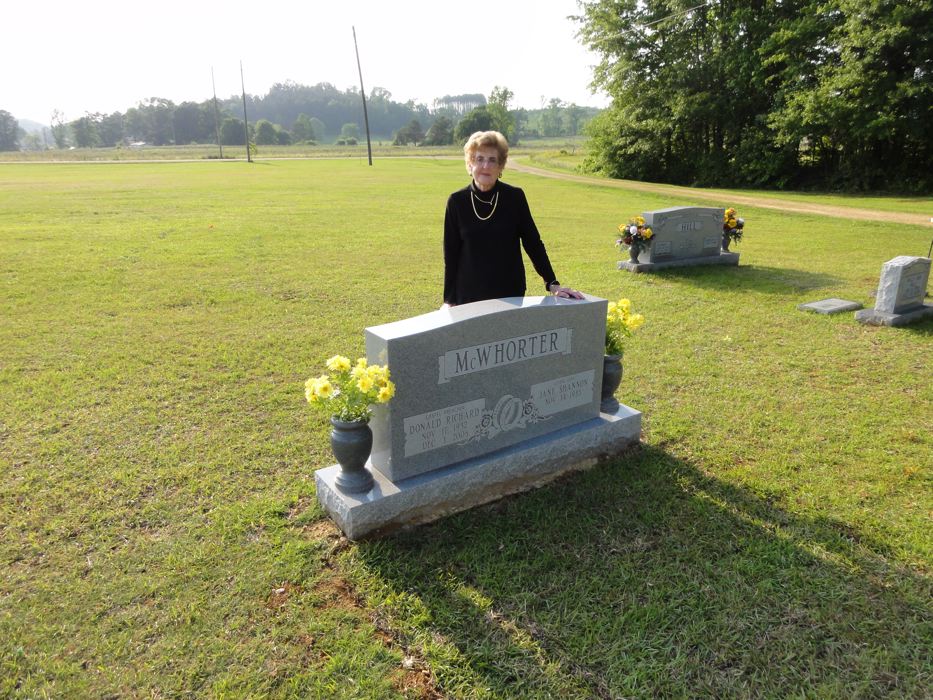
Special thanks to Jane McWhorter for assisting me in locating the grave of her dearly departed husband
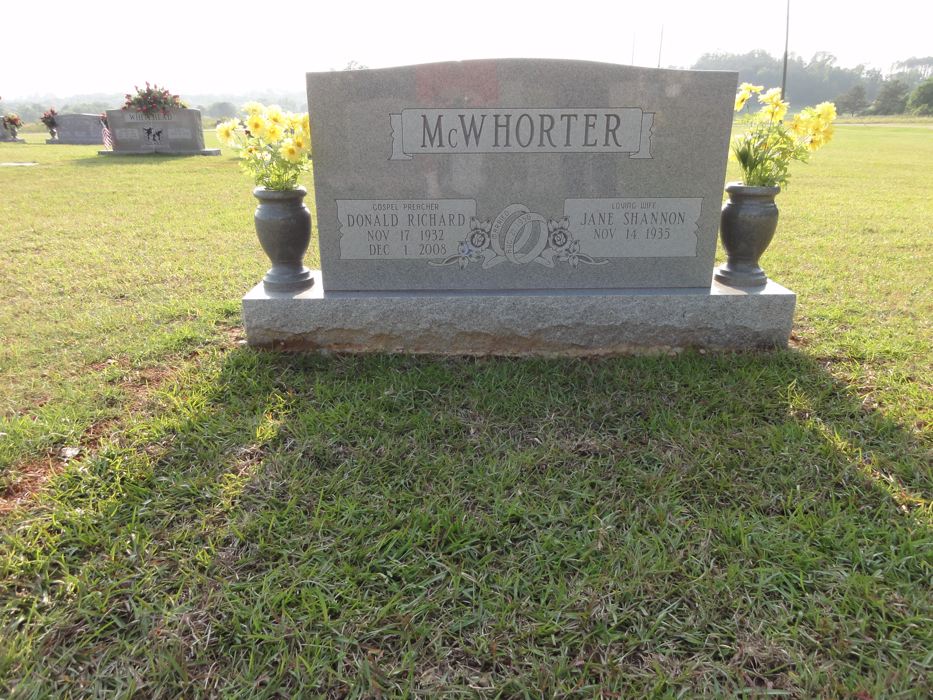
MCWHORTER
Donald Richard & Jane Shannon
Married - August 21, 1956
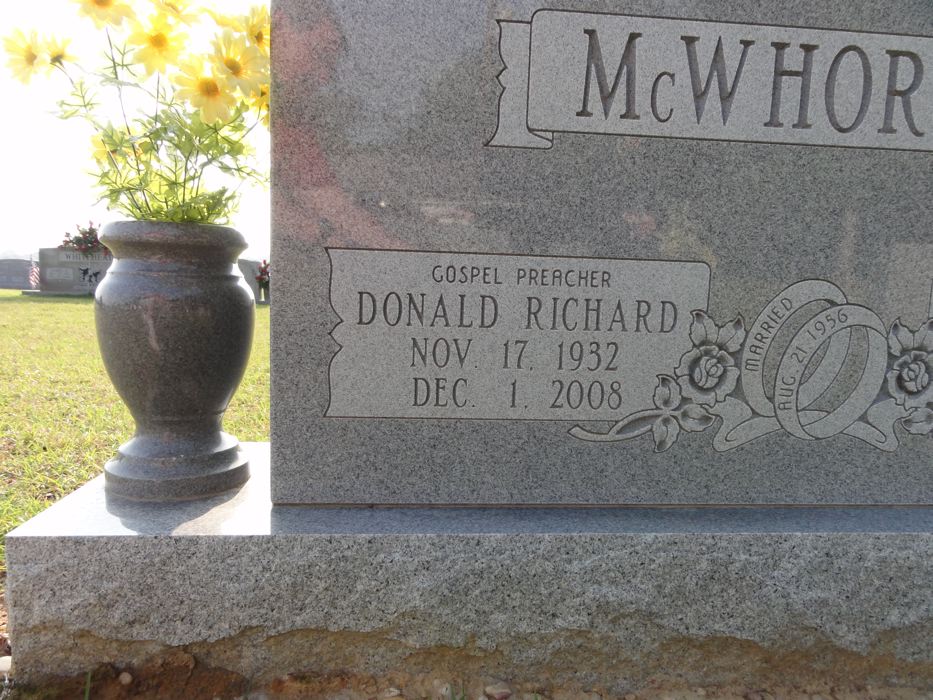
Gospel Preacher
Donald Richard
Nov. 17. 1932
Dec. 1. 2008
![]()
Special Thanks
In May, 2010, while on a research trip to northcentral Alabama, it was my pleasure to visit the grave of Don McWhorter. Knowing the McWhorters lived in Fayette so many years, but not being aware of where he was laid to rest, I called sister Jane and asked for directions. She quickly expressed that she would not like to try to explain how to get there, but would be very happy to take me out to Berea where he is buried. As I was not far away, I immediately proceeded to go by her house. We had a wonderful visit. She was so accomodating, and kind. I want to express my deep thanks to Jane for the time she shared with me. We had a most delightful visit. She not only assisted me in locating the grave, but she later put the wonderful tribute to his life together that you see written above.
![]()
